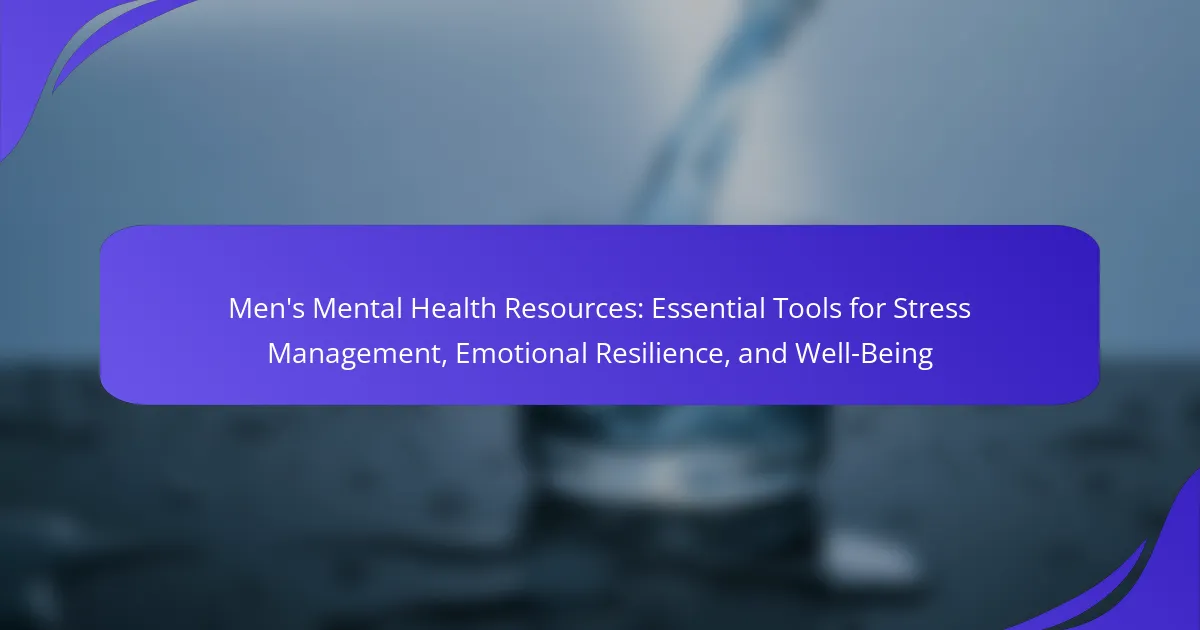Men’s mental health resources are essential for managing stress, building emotional resilience, and enhancing overall well-being. These tools include therapy, support groups, mindfulness practices, and physical activity. Addressing unique challenges like stigma and communication barriers can improve engagement with these resources. A strategic approach to utilizing these tools can lead to significant improvements in mental health outcomes.
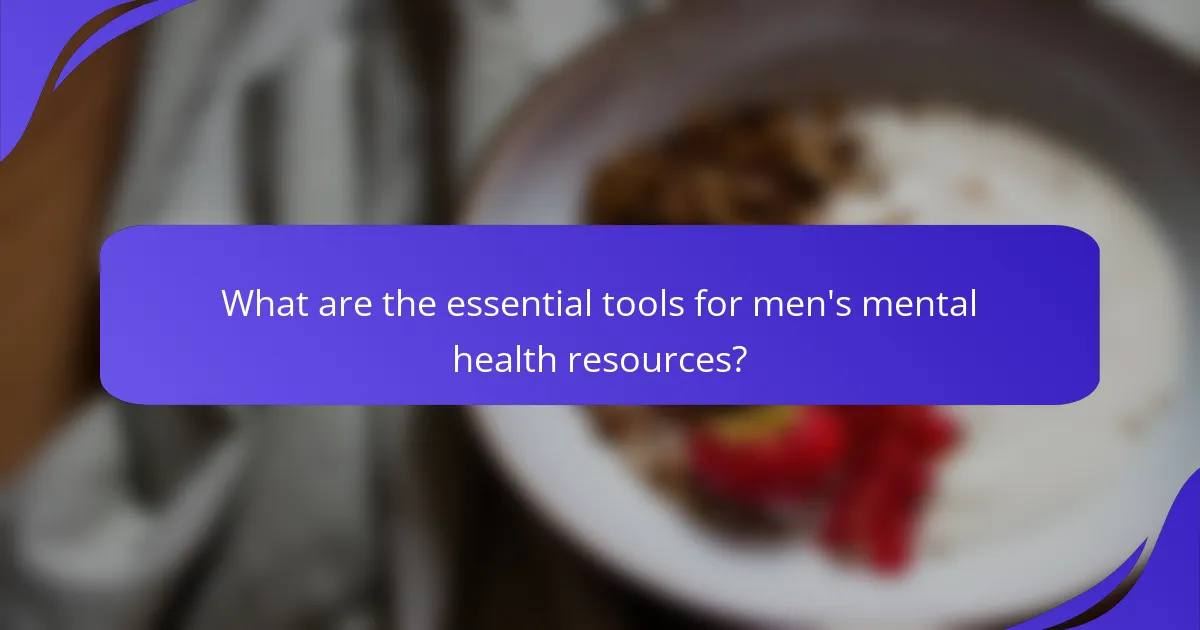
What are the essential tools for men’s mental health resources?
Men’s mental health resources include tools such as therapy, support groups, mindfulness practices, and physical activity. These resources enhance stress management, emotional resilience, and overall well-being.
Therapy offers personalized strategies to cope with mental health challenges. Support groups provide community and shared experiences, fostering connection. Mindfulness practices, like meditation, promote present-moment awareness, reducing anxiety. Regular physical activity improves mood and reduces stress through endorphin release.
Incorporating these tools creates a holistic approach to mental health, addressing both emotional and physical aspects. Prioritizing these resources can lead to significant improvements in men’s mental health outcomes.
How can stress management techniques improve mental well-being?
Stress management techniques significantly enhance mental well-being by reducing anxiety and improving emotional resilience. Techniques such as mindfulness, exercise, and cognitive-behavioral strategies empower individuals to cope with stress effectively. Research indicates that regular practice of these methods can lead to a 30% reduction in stress levels. Additionally, engaging in physical activity releases endorphins, which further boosts mood and promotes overall mental health. By implementing these strategies, men can cultivate a healthier mindset, fostering long-term emotional stability and well-being.
What are the most effective stress relief strategies?
Effective stress relief strategies include physical exercise, mindfulness meditation, deep breathing exercises, and social support. These techniques enhance emotional resilience and overall well-being. Regular physical activity can reduce anxiety and improve mood. Mindfulness practices, such as meditation, help individuals stay present and manage stress effectively. Deep breathing exercises promote relaxation by lowering heart rate and calming the mind. Engaging with supportive friends or family provides emotional comfort and reduces feelings of isolation.
Which breathing exercises help reduce anxiety?
Breathing exercises that help reduce anxiety include diaphragmatic breathing, box breathing, and 4-7-8 breathing. These techniques promote relaxation and emotional resilience.
Diaphragmatic breathing involves deep inhalations through the nose, expanding the diaphragm, followed by slow exhalations. This method reduces stress and lowers heart rate.
Box breathing consists of four equal parts: inhaling for four counts, holding for four counts, exhaling for four counts, and holding again for four counts. This structured approach enhances focus and calms the mind.
4-7-8 breathing encourages inhaling for four counts, holding for seven counts, and exhaling for eight counts. This technique is effective for promoting sleep and reducing anxiety levels.
What role does emotional resilience play in men’s mental health?
Emotional resilience significantly enhances men’s mental health by enabling effective stress management. It fosters coping strategies, promotes positive thinking, and encourages emotional expression. Studies show that resilient men report lower levels of anxiety and depression, leading to improved overall well-being. Building emotional resilience through practices like mindfulness and social support can provide essential tools for navigating life’s challenges.
How can building emotional resilience benefit men?
Building emotional resilience can significantly benefit men by enhancing their mental health and coping strategies. Improved emotional resilience allows men to manage stress more effectively, navigate challenges, and maintain well-being. It fosters healthier relationships and promotes a positive self-image, which are crucial for overall mental health. Studies show that resilient individuals experience lower rates of anxiety and depression, leading to a more fulfilling life.
What practices enhance emotional resilience?
Practices that enhance emotional resilience include mindfulness, physical activity, social support, and cognitive restructuring. Mindfulness promotes present-moment awareness, reducing stress. Regular physical activity boosts mood and energy. Social support fosters connection, providing emotional safety. Cognitive restructuring helps reframe negative thoughts, enhancing coping strategies. These practices collectively improve overall mental health and well-being.
What are the common mental health challenges faced by men?
Men face common mental health challenges such as depression, anxiety, and stress. These issues often stem from societal expectations and stigma surrounding men’s emotional expression. Research indicates that men are less likely to seek help, which can exacerbate their struggles. Effective resources include therapy, support groups, and mindfulness techniques, promoting emotional resilience and well-being. Understanding these challenges is crucial for improving men’s mental health outcomes.
How do societal expectations impact men’s mental health?
Societal expectations significantly influence men’s mental health by creating pressure to conform to traditional norms. These expectations often discourage emotional expression, leading to increased stress and anxiety. Men may feel compelled to appear strong and self-reliant, which can hinder their willingness to seek help. Studies suggest that men are less likely to access mental health resources due to fear of stigma. As a result, this can exacerbate feelings of isolation and depression. Addressing societal expectations is crucial for improving men’s mental well-being and encouraging healthier coping strategies.
What are the signs of mental health issues in men?
Signs of mental health issues in men include persistent sadness, irritability, changes in appetite, withdrawal from social activities, and difficulty concentrating. Men may also exhibit physical symptoms like fatigue or unexplained aches. Recognizing these signs is crucial for early intervention and accessing mental health resources.
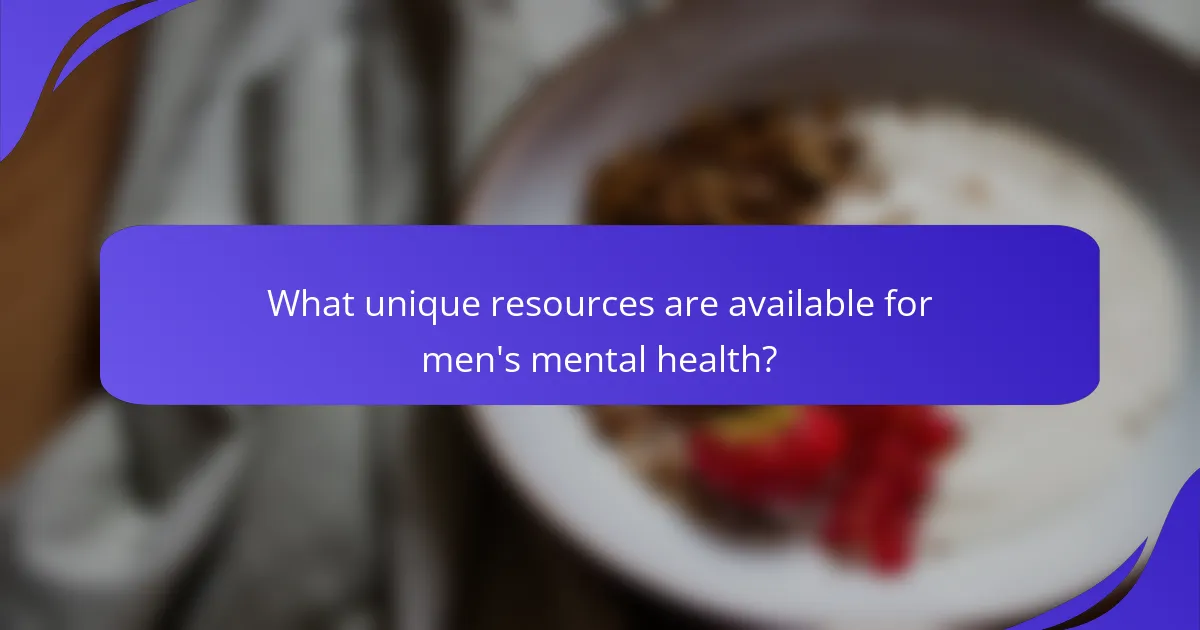
What unique resources are available for men’s mental health?
Men’s mental health resources include therapy, support groups, and online tools tailored for emotional resilience. These resources address unique challenges faced by men, such as stigma and communication barriers.
Therapy options like cognitive behavioral therapy (CBT) help manage stress and anxiety effectively. Support groups provide a safe space for sharing experiences and fostering connection. Online platforms offer accessible resources, including articles and forums, which enhance understanding of mental health issues.
Engaging with these resources promotes well-being and encourages proactive mental health management among men.
How can peer support groups aid in mental health management?
Peer support groups significantly enhance mental health management by providing community, understanding, and shared experiences. Participants benefit from emotional support, reducing feelings of isolation. These groups foster resilience, offering coping strategies and practical advice tailored to men’s unique mental health challenges. Research indicates that peer support can lead to improved well-being and lower stress levels.
What are the benefits of joining a men’s mental health support group?
Joining a men’s mental health support group offers numerous benefits, including improved emotional resilience, reduced feelings of isolation, and enhanced stress management skills. Participants often experience a sense of community and belonging, which can significantly boost their overall well-being. These groups provide a safe space for sharing experiences and coping strategies, fostering personal growth and understanding. Additionally, engaging in regular discussions can lead to increased awareness of mental health issues, empowering men to seek help when needed.
Which apps are most effective for mental health tracking?
Mental health tracking apps enhance emotional resilience by providing tools for stress management. Effective options include Headspace, Calm, Moodfit, and Daylio, each offering unique features for monitoring mental well-being. Headspace focuses on guided meditation, Calm emphasizes sleep improvement, Moodfit tracks mood and activities, and Daylio allows users to log daily experiences. These apps empower users to cultivate awareness and manage stress effectively.
What features should a mental health app provide?
A mental health app should provide features that enhance emotional resilience and stress management. Key features include personalized assessments, guided meditations, mood tracking, community support, and educational resources.
Personalized assessments help users identify their mental health needs. Guided meditations offer tools for relaxation and mindfulness. Mood tracking allows users to monitor their emotional states over time. Community support fosters connection and shared experiences. Educational resources provide valuable information on mental health topics.
What role does physical fitness play in mental health?
Physical fitness significantly enhances mental health by reducing stress, anxiety, and depression. Regular exercise releases endorphins, which improve mood and promote emotional resilience. Studies show that physical activity can lead to a 20-30% reduction in symptoms of anxiety and depression. Furthermore, engaging in fitness routines fosters social connections and a sense of achievement, contributing to overall well-being.
How can regular exercise improve mood and reduce stress?
Regular exercise significantly enhances mood and alleviates stress. Physical activity releases endorphins, which are natural mood lifters. Engaging in regular workouts can lead to improved emotional resilience, providing essential tools for stress management. Studies indicate that just 30 minutes of moderate exercise can reduce anxiety and depressive symptoms. Additionally, exercise fosters social connections through group activities, further supporting mental well-being.
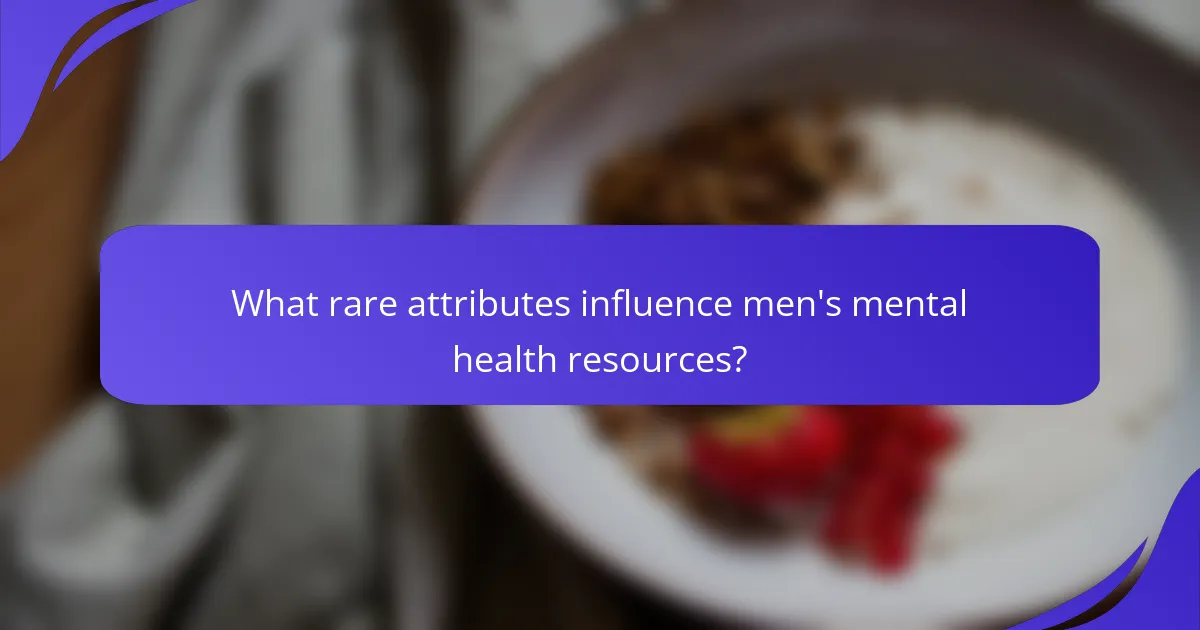
What rare attributes influence men’s mental health resources?
Rare attributes influencing men’s mental health resources include cultural stigma, accessibility of services, and tailored communication styles. These factors shape how men engage with mental health resources. For instance, cultural stigma often discourages men from seeking help, while accessibility can vary based on location and socioeconomic status. Tailored communication styles that resonate with men’s experiences can enhance the effectiveness of these resources. Understanding these rare attributes is crucial for improving engagement and outcomes in men’s mental health initiatives.
How do cultural perceptions of masculinity affect mental health resources?
Cultural perceptions of masculinity often hinder men’s access to mental health resources. Traditional views emphasize stoicism, which discourages emotional expression and seeking help. This stigma leads to underutilization of available resources, impacting stress management and emotional resilience. Studies show that men are less likely to seek therapy, with only 25% of men accessing mental health services compared to women. Addressing these perceptions is crucial for improving men’s well-being and encouraging healthier coping strategies.
What unique challenges do men from different backgrounds face?
Men from different backgrounds face unique challenges that impact their mental health. Cultural stigma around emotional expression can hinder access to support. Economic disparities may limit resources for stress management. Additionally, varying societal expectations can create pressure to conform, affecting emotional resilience. Understanding these factors is essential for developing effective mental health resources tailored to diverse needs.
What innovative programs exist for mental health in men?
Innovative programs for men’s mental health focus on peer support, therapy, and skill-building workshops. Organizations like Movember and Men’s Sheds provide unique resources that foster community and resilience. These programs address stigma while enhancing emotional well-being through shared experiences and practical tools. For example, Movember’s initiatives promote discussions around mental health, encouraging men to seek help and connect with others.
How can creative therapies support men’s mental health?
Creative therapies significantly enhance men’s mental health by fostering emotional expression and resilience. These therapies, such as art and music therapy, provide safe spaces for men to explore feelings often suppressed due to societal norms. Engaging in creative activities can reduce stress levels, improve mood, and promote overall well-being. Research indicates that men participating in these therapies report increased emotional awareness and coping skills. This unique approach addresses the root attribute of emotional resilience, essential for managing mental health challenges.
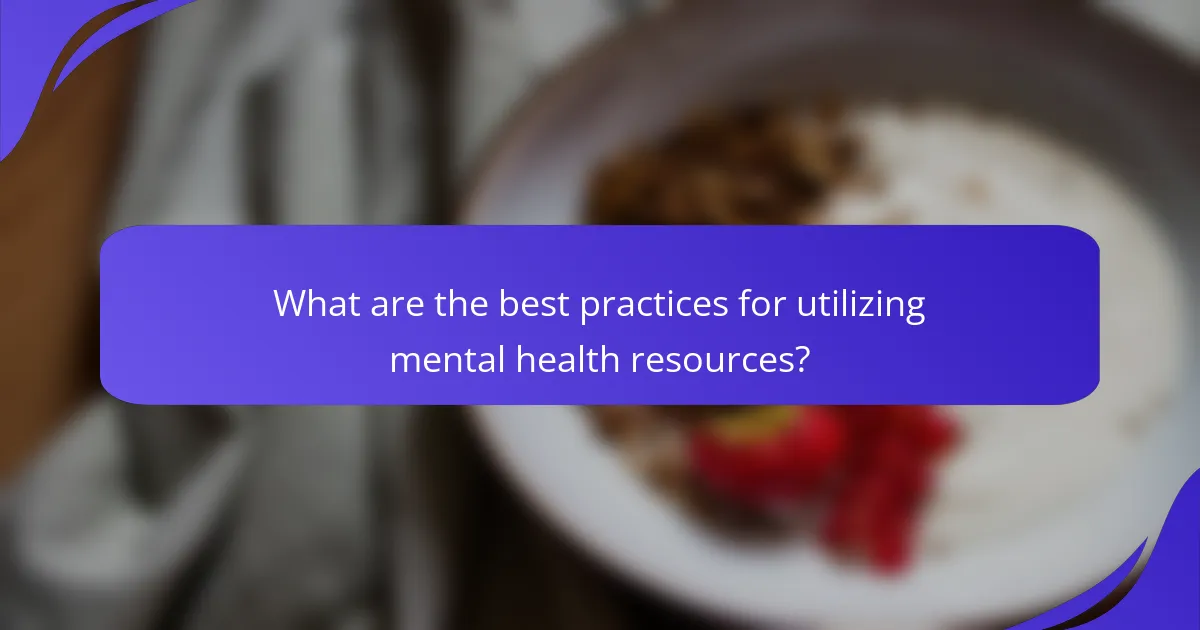
What are the best practices for utilizing mental health resources?
Utilizing mental health resources effectively requires a strategic approach. First, identify your specific needs, such as stress management or emotional resilience. Next, prioritize resources that offer evidence-based practices, such as therapy, support groups, and mindfulness apps. Engage regularly with these tools to build a consistent routine. Finally, evaluate your progress and adjust your strategies as necessary to enhance your well-being.
How can men effectively integrate mental health tools into daily life?
Men can effectively integrate mental health tools into daily life by establishing consistent routines and utilizing accessible resources. Regular practices such as mindfulness meditation, journaling, and physical exercise enhance emotional resilience and stress management.
Incorporating technology, apps for mental health tracking and guided meditation can provide valuable support. Engaging in social connections and seeking professional help when needed further strengthen overall well-being.
A structured approach, including setting specific times for these activities, can significantly improve adherence and effectiveness. Prioritizing mental health as an essential part of daily life leads to lasting positive changes.
What common mistakes should men avoid when seeking mental health support?
Men should avoid several common mistakes when seeking mental health support. These include neglecting to prioritize their mental health, resisting vulnerability, and dismissing the importance of professional help.
Many men may believe they can manage their stress alone, which can lead to worsening mental health. They often feel pressure to appear strong and self-reliant, making them hesitant to express their emotions. Additionally, some men may overlook the benefits of therapy or counseling, viewing it as a sign of weakness rather than a valuable resource for emotional resilience.
Ignoring the signs of mental distress is another critical mistake. Recognizing symptoms early can lead to timely intervention, improving overall well-being. Seeking support from friends or family is beneficial, but it should not replace professional guidance.
Finally, men should avoid stigmatizing mental health discussions. Open conversations can foster understanding and encourage others to seek help, creating a supportive environment for mental wellness.
How can men maintain long-term mental well-being?
Men can maintain long-term mental well-being by utilizing effective strategies and resources. Regular physical activity, such as exercise, boosts mood and reduces stress. Mindfulness practices, including meditation and deep breathing, enhance emotional resilience. Establishing strong social connections provides support and combats feelings of isolation. Seeking professional help, such as therapy or counseling, offers guidance for managing mental health challenges. Engaging in hobbies and interests fosters a sense of purpose and fulfillment. Prioritizing sleep and nutrition is crucial for overall mental health.
